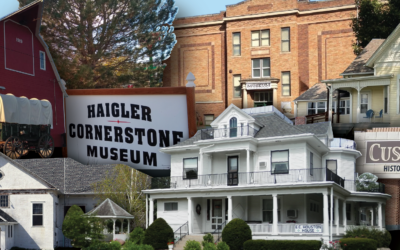The economically devastating years of the early 1890s created hardship for many Nebraska residents. In 1893, for example, crops in Nebraska were almost totally destroyed by hot winds and drought. Urban dwellers as well suffered from the heat and lack of water. The Grand Island Independent on June 21, 1893, urged city residents to limit the use of water “for lawn purposes”:
“‘No water,’ was the cry all around the city this morning notwithstanding the fact that the pumps at the water works have been doing their best and not even resting for meals or sleep.
“At eight o’clock no water could be secured on the second and third floors of the Independent building. The Security bank elevator had declined to carry more than one passenger and the Canning Factory is greatly harassed by the want of water. Last night an explosion almost resulted there on that account and the factory is today putting in a well of its own and will connect the same with its machinery. Other business places also were put to a great inconvenience on account of the weak pressure. At the Koehler hotel building, for instance, no water could be secured on the third floor where the main work is now going on and water had to be carried during portions of the day.
“The ordinance of the city plainly forbid the use of water for lawn purposes excepting from six o’clock a.m. to eight a.m. and from 5 p.m. to 9 p.m. Notwithstanding this fact many are using water for lawn purposes almost all day and night. Some even go so far as to take the nozzle off, put the hose in the grass and thus conceal the fact that the water is running. Some perhaps use the water out of the prescribed hours not knowing the time, but there is no earthly excuse for this.
“The engineer at the waterworks informs us that both pumps are running night and day. ‘This morning’ said he ‘at about eleven o’clock we had fifty feet of water in the pipe, and at this hour we haven’t an inch more. If you would go around town and look closely you could find many sprinklers running.’
“Attention has been called to the subject so often and still there are those who would virtually steal the water when it actually does them no good. If they would close their hydrants at eight o’clock in the morning and keep them closed there would be a fine pressure in the evening which all could enjoy. Then, too, there is no safety in case of fire. Suppose a severe fire would start on such an afternoon as this has been.
“Imagine the consequences and obey the water ordinance.”



